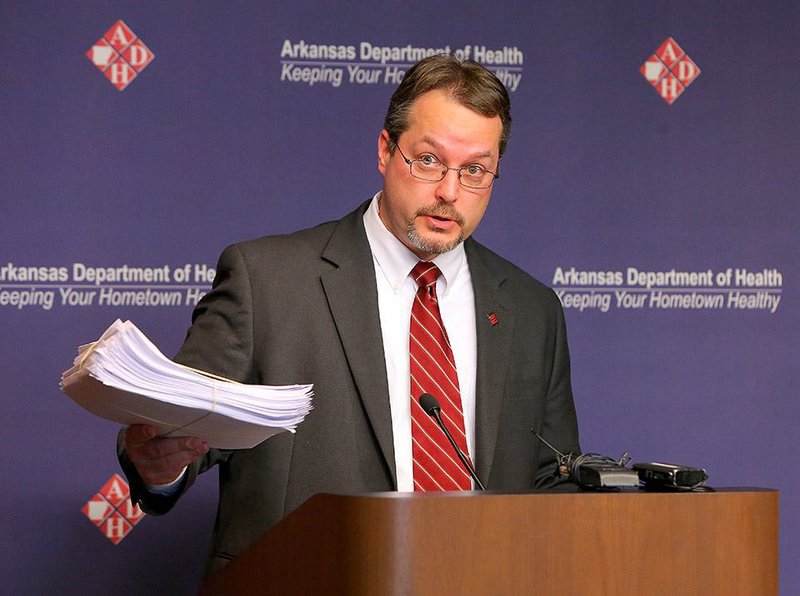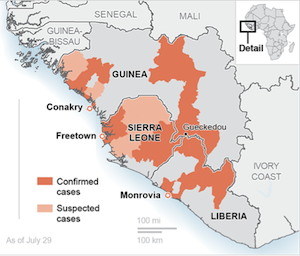A Clinton hospital's decision to temporarily isolate a patient because of a concern about the possibility of Ebola is an example of how hospitals are prepared for the deadly virus in Arkansas, Department of Health officials said Thursday.
Ozark Health Medical Center went into alert after a patient with travel history to an affected West African country went to the hospital for treatment, department spokesman Kerry Krell said. After further evaluation, it was determined the patient was not at risk for Ebola, she said.
Neither Health Department nor Ozark Health Medical Center officials would release which country the patient traveled from or symptoms the patient had.
Dirk Haselow, department state epidemiologist, said the patient was screened quickly after going to the hospital's emergency room late Thursday morning, and hospital officials contacted the Health Department and Centers for Disease Control and Prevention.
Health officials, including those at the CDC, determined the patient was not at risk for Ebola, Haselow said. The assessment included a series of questions and common health tests, he said. The patient was not specifically tested for the Ebola virus, he said.
"I think what happened today is a good example of things ramping up fast and ramping back down nearly as fast," Haselow said.
David Deaton, Ozark Health Center chief executive, said the patient was placed in isolation and staff members used personal protective gear before learning the patient was not at risk.
"I think our employees reacted extremely well and professional," Deaton said. "We want the community to know that we are going to take steps to protect not just our own staff but the particular patient as well as other patients."
Krell said it is likely there will be similar situations later at other hospitals in Arkansas.
"That is a good thing," Krell said. "That means these hospitals are taking these steps."
Training measures in the state have increased in recent weeks after the diagnoses of Ebola in two nurses in Dallas who cared for an Ebola patient who later died, Krell said
The Health Department will start videoconference training about Ebola measures with hospitals and other health care providers across the state next week, Krell said. The training was set up because health care professionals have asked state officials for more information, said Gary Wheeler, the department's medical director.
"There is nothing that has changed about the virus transmission and how you protect oneself," Wheeler said. "The thing that has changed is that actually carrying out the steps is challenging for people to do."
The department is continuing to use CDC guidelines when training health care workers, Wheeler said, although he acknowledged those guidelines could change.
Jason McDonald, a CDC spokesman, said there is discussion of revamping guidelines that address personal protective equipment -- known as PPEs -- that health care providers use when treating Ebola patients. Those include special tools and clothing.
"There may have been PPE that was not used properly," McDonald said, referring to the Dallas cases. "There may have been exposed skin. We are looking at our guidelines."
The Health Department spent about six weeks training hospital workers how to screen for Ebola, Wheeler said. Training switched to the use of personal protective equipment after the diagnoses of Ebola in a Dallas patient Sept. 30, he said.
"Theoretically, hospitals already know how to use PPEs," Wheeler said. "But with Ebola there is not quite the room for error."
The first videoconferences will be open to hospital officials, Haselow said. This could include nurses, emergency room registration officials or even administrators, he said. The department will then offer training for nurses and physicians in clinic settings. Later training sessions will be available for the general public, he said.
The department plans to use an interactive platform that will allow people to connect via videoconferencing equipment or through personal computers, Haselow said. It also will allow people to ask questions. Some of the later training sessions will be recorded so people can rewatch them, he said.
Rhonda Finnie, president of the Arkansas Nurses Association, said nurses in the state want confidence in practices used to treat Ebola.
"There is a little bit of anxiety being that there are two nurses exposed and we don't know where those failures were," Finnie said. "That will be a concern until we are confident that this is the last exposure."
Many nurses are waiting for updates from the CDC on use of personal protective equipment, Finnie said. The increase in training is helping to ease concerns, she said.
"We have seen an increase of efforts and we see an increase in people who want information," Finnie said.
Shane Speights, vice president for medical affairs at St. Bernards Medical Center in Jonesboro, said staff members have been training on using personal protective equipment in recent days.
"You have to go in and dust the books off," Speights said. "You have to re-educate and you have to bring in your staff and go over personal protective equipment to limit exposure to patients and staff."
Staff members at the hospital go through training about using the equipment about once a year, Speights said. Employees also have been training on how to screen for Ebola. The training has focused on employees who could see these patients first, he said.
"There is no way you are going to be able to train every one of your employees who would come into contact with this patient," Speights said. "You have to look at your root of entry and you have to figure out what do we have to put in place."
This includes triage nurses in emergency rooms or nurses and doctors at clinic offices, Speights said.
UAMS Medical Center in Little Rock is continuing to train staff members on screening, isolation and gear procedures, said Keyur Vyas, an associate professor of medicine in the infectious diseases division at the University of Arkansas for Medical Sciences.
The health care network has not changed the way it is training its staff after the Dallas Ebola cases, Vyas said. However, the cases have emphasized why the training should occur, he said.
"I think hospitals across the country may have perceived themselves not at risk until this," Vyas said.
A Section on 10/17/2014


